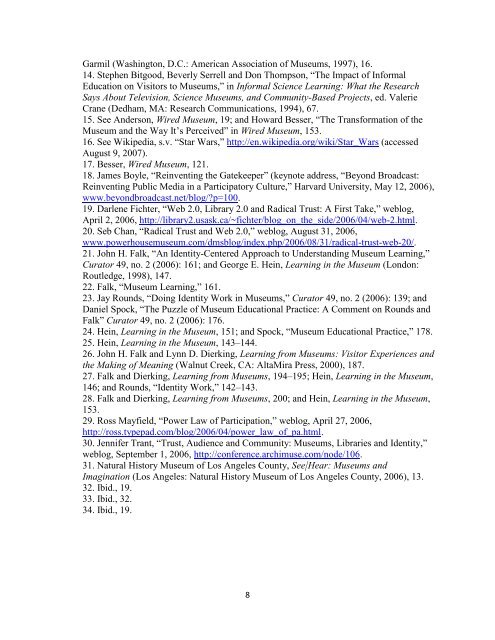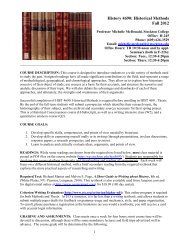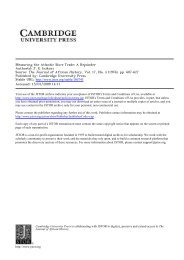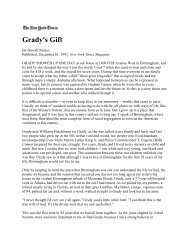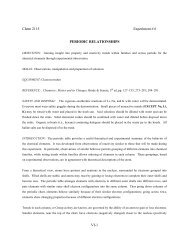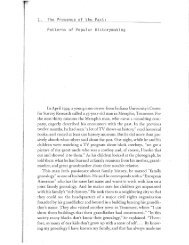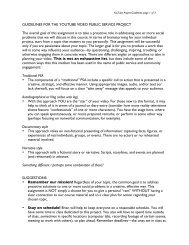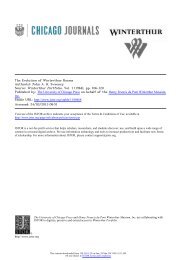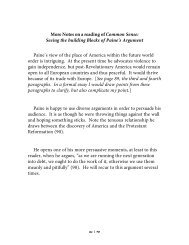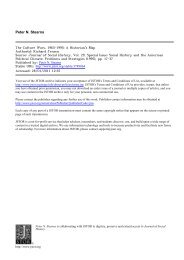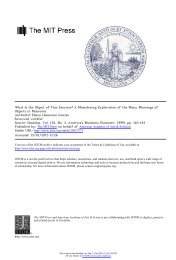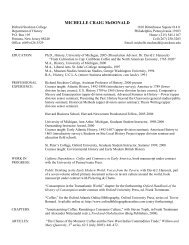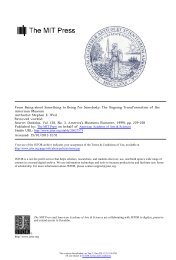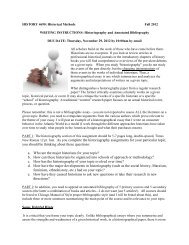can museum allow online users to become participants?
can museum allow online users to become participants?
can museum allow online users to become participants?
You also want an ePaper? Increase the reach of your titles
YUMPU automatically turns print PDFs into web optimized ePapers that Google loves.
Garmil (Washing<strong>to</strong>n, D.C.: Ameri<strong>can</strong> Association of Museums, 1997), 16.<br />
14. Stephen Bitgood, Beverly Serrell and Don Thompson, ―The Impact of Informal<br />
Education on Visi<strong>to</strong>rs <strong>to</strong> Museums,‖ in Informal Science Learning: What the Research<br />
Says About Television, Science Museums, and Community-Based Projects, ed. Valerie<br />
Crane (Dedham, MA: Research Communications, 1994), 67.<br />
15. See Anderson, Wired Museum, 19; and Howard Besser, ―The Transformation of the<br />
Museum and the Way It‘s Perceived‖ in Wired Museum, 153.<br />
16. See Wikipedia, s.v. ―Star Wars,‖ http://en.wikipedia.org/wiki/Star_Wars (accessed<br />
August 9, 2007).<br />
17. Besser, Wired Museum, 121.<br />
18. James Boyle, ―Reinventing the Gatekeeper‖ (keynote address, ―Beyond Broadcast:<br />
Reinventing Public Media in a Participa<strong>to</strong>ry Culture,‖ Harvard University, May 12, 2006),<br />
www.beyondbroadcast.net/blog/?p=100.<br />
19. Darlene Fichter, ―Web 2.0, Library 2.0 and Radical Trust: A First Take,‖ weblog,<br />
April 2, 2006, http://library2.usask.ca/~fichter/blog_on_the_side/2006/04/web-2.html.<br />
20. Seb Chan, ―Radical Trust and Web 2.0,‖ weblog, August 31, 2006,<br />
www.powerhouse<strong>museum</strong>.com/dmsblog/index.php/2006/08/31/radical-trust-web-20/.<br />
21. John H. Falk, ―An Identity-Centered Approach <strong>to</strong> Understanding Museum Learning,‖<br />
Cura<strong>to</strong>r 49, no. 2 (2006): 161; and George E. Hein, Learning in the Museum (London:<br />
Routledge, 1998), 147.<br />
22. Falk, ―Museum Learning,‖ 161.<br />
23. Jay Rounds, ―Doing Identity Work in Museums,‖ Cura<strong>to</strong>r 49, no. 2 (2006): 139; and<br />
Daniel Spock, ―The Puzzle of Museum Educational Practice: A Comment on Rounds and<br />
Falk‖ Cura<strong>to</strong>r 49, no. 2 (2006): 176.<br />
24. Hein, Learning in the Museum, 151; and Spock, ―Museum Educational Practice,‖ 178.<br />
25. Hein, Learning in the Museum, 143–144.<br />
26. John H. Falk and Lynn D. Dierking, Learning from Museums: Visi<strong>to</strong>r Experiences and<br />
the Making of Meaning (Walnut Creek, CA: AltaMira Press, 2000), 187.<br />
27. Falk and Dierking, Learning from Museums, 194–195; Hein, Learning in the Museum,<br />
146; and Rounds, ―Identity Work,‖ 142–143.<br />
28. Falk and Dierking, Learning from Museums, 200; and Hein, Learning in the Museum,<br />
153.<br />
29. Ross Mayfield, ―Power Law of Participation,‖ weblog, April 27, 2006,<br />
http://ross.typepad.com/blog/2006/04/power_law_of_pa.html.<br />
30. Jennifer Trant, ―Trust, Audience and Community: Museums, Libraries and Identity,‖<br />
weblog, September 1, 2006, http://conference.archimuse.com/node/106.<br />
31. Natural His<strong>to</strong>ry Museum of Los Angeles County, See|Hear: Museums and<br />
Imagination (Los Angeles: Natural His<strong>to</strong>ry Museum of Los Angeles County, 2006), 13.<br />
32. Ibid., 19.<br />
33. Ibid., 32.<br />
34. Ibid., 19.<br />
8


